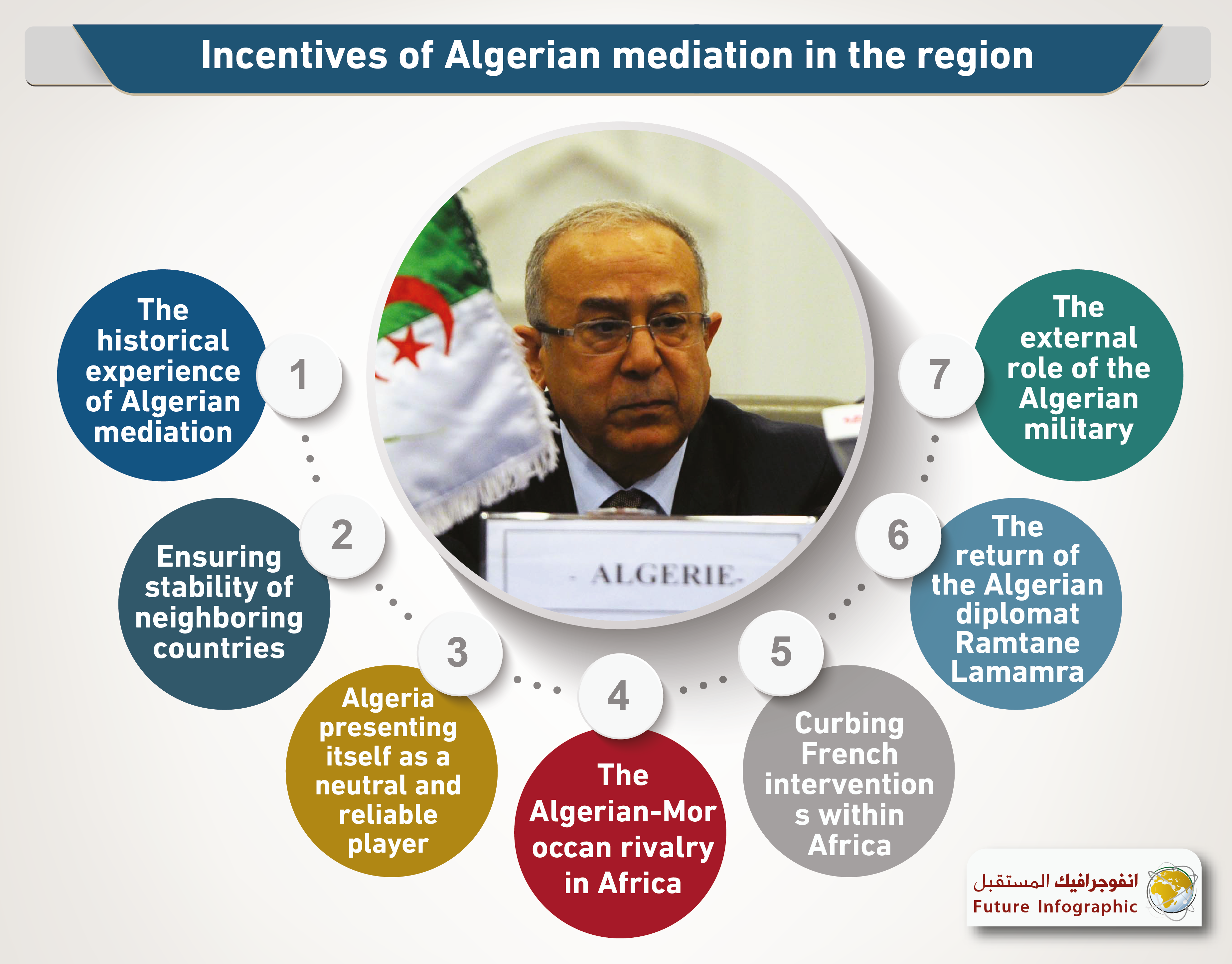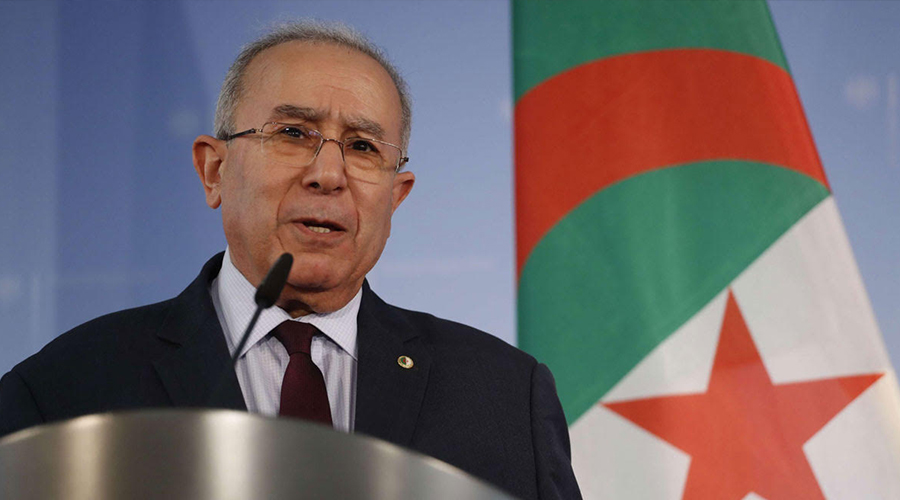Algeria's mediation endeavors are based on a well-established foreign policy of creating stability in the region and maintaining the status quo, for fear of any radical change that could lead to chaos and instability. This rule stems mainly from the political memory that has been lingering since the events of the ‘Black Decade’, which almost destroyed Algeria and its stability. This analysis highlights indications of the growing Algerian mediation endeavors in various recent crises in the region, such as the situation in Tunisia following president Kais Saied's decisions on July 25, 2021, the Libyan crisis and the complex political transition, the crisis of the Renaissance Dam between Egypt and Sudan on the one hand and Ethiopia on the other, as well as the crisis in Mali.
Indicators of the Algerian mediation
Algeria has recently been involved in several mediation endeavors in the region's crises, particularly following the appointment of Ramtane Lamamra as Foreign Minister to the new government in July. This can be illustrated as follows:
1- The political crisis in Tunisia: Algeria perceives Tunisia's stability as somewhat of a clear impact on it, particularly since Tunisia is Algeria's remaining safe land port after the closure of the Algerian-Moroccan borders, and within the security problems on the borders with Libya, Mali and Niger. The Algerian government’s interest in the developments within Tunisia are not hidden. President Tebboune had two telephone calls with his Tunisian counterpart, Kais Saied, within four days, and recently told the press that "Kais Saied told me things that cannot be revealed”, which implies the specificity of the Tunisian-Algerian relations, particularly since this statement came in the context of Algeria's refusal to exert any external pressures on Tunisia.
Furthermore, Algerian Foreign Minister Ramtane Lamamra visited Tunisia twice on July 27 and August 1 within this context. Despite talks about the Algerian mediation role within the Tunisian debacle, neither side has revealed any details about the mediation. While Algeria has stressed that what is happening in Tunisia is an internal matter, it has not explicitly supported the measures adopted by President Saied. This is interpreted by some as ‘positive neutrality’, which is consistent with the mediator role it plays, which is also perceived as a credible role by all Tunisian parties.
2- The political conflict within Libya: Algeria was reserved about intervention at the onset of the Libyan crisis, but threw its weight in pursuing the implementation of the 2020 Berlin road map, which is founded on the need for UN-supervised general elections on December 24, 2021. In late May, Libya's Prime Minister-designate of the new Government of National Unity (GNU), Abdul Hamid Dbeibeh, called on Algerian President Tebboune to support reconciliation between all parties as a neutral party.
3- The crisis of the Ethiopian Renaissance Dam: As the UN Security Council failed to reach a binding agreement regarding the Renaissance Dam and with the unsuccessful negotiations between the three parties (Egypt, Sudan and Ethiopia), Algeria is working to end the political stalemate in this crisis and to bring the three countries back to negotiations and to finding a common ground for consensus, which in itself is quite a progress.
Ethiopia's response to Algerian mediation came after it had previously rejected similar endeavors from Tunisia and other countries in the region. This reflects a mutual trust between both parties, as Addis Ababa resolved the dispute between Algeria and Morocco over what was known as the "The Sand War", and Algeria intervened as a neutral party to the Ethiopian-Eritrean conflict which led to the ceasefire in 2000. Algeria is relying heavily on the success of this mediation, particularly with the successful tour conducted by the Algerian Foreign Minister in Ethiopia, Sudan and Egypt in late July 2021.
4- The boundary dispute between Khartoum and Addis Ababa: based on the Ethiopian government's confidence in Algeria, the former called on the latter to adopt mediation between Ethiopia and Sudan to end the boundary dispute over the Fasika, by convincing Khartoum of the necessity of the understandings with Addis Ababa to reach a political settlement. Although this initiative came amidst a larger file of resolving the Renaissance Dam crisis, it may reflect Ethiopia's endeavors to settle its problems with Sudan through Algerian mediation and to block any Egyptian-Sudanese cooperation should the peaceful settlement over the Renaissance Dam crisis fails.
5- The political crisis in Mali: Algerian mediation in Mali in 2015 led to an agreement on peace and reconciliation, known as "Algeria's Path". The parties to the crisis in Mali are counting on this agreement to overcome the current political crisis, capitalizing on their relations and political weight with tribes and businessmen within the Northern Malian region. Algeria aims to put its full weight on this issue, rejecting any French role on its Southern borders, for fear of the Southern borders being used to infiltrate the country's strategic depth through terrorist groups and organized crime organizations, such as those of illegal immigration and drug trafficking.
Various motives
There are several drivers and motives behind Algeria's significant mediation attempts in some of the region's crises, most notably:
1- The history: Algerian mediation has historically been active within the post-liberation revolutionary glow, which Algerians call the "Classic Stage of Algerian Mediation", during which it succeeded in stopping the war between Eritrea and Ethiopia in 2000, in addition to the success of its mediation in Madagascar, Mali and Niger. President Tebboune adopted the approach of bringing his country back to the diplomatic forefront with respect to mediation during his presidential election campaign. This was clearly translated into the appointment of Algerian diplomat Ramtane Lamamra as foreign minister in the new government led by Prime Minister Ayman Ben Abdelrahman.
2- Ensuring stability of neighboring countries: political and security stability in the vicinity of Algeria, particularly the Sahel and Sahara regions, is quite central within Algeria's foreign policy parameters which stand on the need for stable political systems to control its expanding borders, particularly on the Eastern borders with Libya and Tunisia, and the Southern borders with Mali and Niger. Relevantly, Algeria fears the flow of weapons from neighboring countries into its strategic depth, with all the relevant concerns about the activity of terrorist organizations, the transnational organized crime, specifically as the political vacuum in Libya and Mali persists, resulting in the deployment of Boko Haram's forces and the expansion of armed militias and terrorist organizations in Libya.
3- A neutral and credible party: Algeria presents itself to the international and regional community as a neutral and credible party in the mediation processes. It stands on the principles of "non-interference in the domestic affairs of states", as well as the promotion of "dialogue and discussion" between the conflicting parties to eliminate uncertainty and reach satisfactory diplomatic solutions to all parties. This comes consistent with the policies of putting out fires and the containment of crises, which it had previously adopted in the Ethiopian-Eritrean war as well as the crises in Mali, Niger and others.
4- The Algerian-Moroccan competition: Algeria's external moves are linked with the Sahara issue and the Algerian-Moroccan boundary dispute. Moroccan political circles believe that Algeria's recent moves, particularly in the Libya and Mali issues, are mainly aimed at undermining Morocco's role within Africa. These views are based on Algeria attacking Mali's new leaders and using the Northern elite (businessmen and politicians) to reorder action, particularly as Mali's transitional President is somehow close to the Moroccan political circles. In the Libyan file, the two neighbors are competing over playing an influential role in the political settlement process.
5- Curbing French interventions: Algeria's perspective of France's role within Africa, particularly in Mali, stems from the basis of rejecting interference in the countries’ domestic affairs, as Paris relies on the use of military force in Northern Mali. This vision amidst the Algerian elite comes from the "colonial view" of the French role in Africa which is based on plundering resources and fueling local conflicts. Thus, Algerian politics seeks to block any role played by France, as is evident in Libya, where Algeria rejects any political role by Haftar, to spite France. Algeria is also closely following the political developments in Tunisia after the July 25 resolutions, with clear concerns that there may be a French role in mapping Tunisia's political agenda over the coming phase.
6- The return of Algerian diplomat Ramtane Lamamra: The return of Ramtane Lamamra to lead Algeria's foreign policy file may be an opportunity to restore the latter's diplomatic leadership, particularly since he has extensive international experience in mediation, specifically in Africa. He engineered over 40 peace processes as the African Union's Commissioner for Peace and Security, in addition to serving as a member of the UN Secretary-General's High-Level Advisory Board on Mediation.
7- The external role of the Algerian military: Recent constitutional amendments have allowed the Algerian army to be assigned military missions abroad in accordance with Article 30 of the new constitution. Accordingly, the Algerian army is now allowed to participate in external missions in the context of efforts by the UN, the African Union and the Arab League to establish security and world peace. Thus, this amendment supports Algerian mediation endeavors.


Finally, Algeria's model is one of the most prominent models of effective mediation within the region, due its critical geographical location amidst conflicts, its regional effectiveness, particularly within the African Union and its various organizations, and its endeavors to dissociate from regional and international conflicts and allies. This has led external parties to trust Algeria's intervention, whether at the country level, as in the Renaissance Dam crisis, or amidst various groups, as in Mali.
Nonetheless, Algerian mediation may face obstacles in other cases because of its adherence to its positions. For instance, in Libya, Algeria adopted the directions of Al-Sarraj government implicitly to spite France, while Algerian officials justified this step by the UN recognition of Al-Sarraj government, ignoring the Turkish intervention and the plunging of foreign mercenaries into the civil war.
Perhaps the main challenge around Algeria's growing mediation role in the region relates to its lack of effective development and relief endeavors in these conflict zones that need economic and developmental reform, particularly those in Africa. Despite the recent establishment of a relief organization by Algeria, its role remains insignificant so far.


